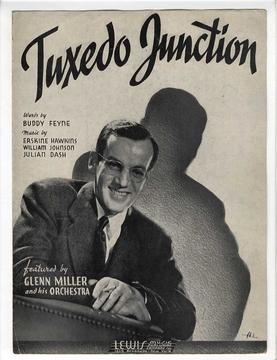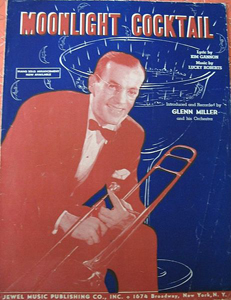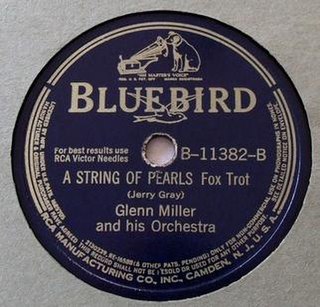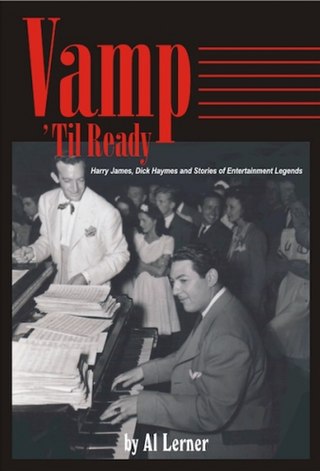
Alton Glen Miller was an American big band founder, owner, conductor, composer, arranger, trombone player and recording artist before and during World War II, when he was an officer in the US Army Air Forces. Glenn Miller and His Orchestra was one of the most popular and successful bands of the 20th century and the big band era. His military group, the Major Glenn Miller Army Air Forces Orchestra, was also popular and successful.

"In the Mood" is a popular big band-era jazz standard recorded by American bandleader Glenn Miller. "In the Mood" is based on the composition "Tar Paper Stomp" by Wingy Manone. The first recording under the name "In the Mood" was released by Edgar Hayes & His Orchestra in 1938.

"Chattanooga Choo Choo" is a 1941 song written by Mack Gordon and composed by Harry Warren. It was originally recorded as a big band/swing tune by Glenn Miller and His Orchestra and featured in the 1941 movie Sun Valley Serenade. It was the first song to receive a gold record, presented by RCA Victor in 1942, for sales of 1.2 million copies.

Glenn Miller and His Orchestra was an American swing dance band formed by Glenn Miller in 1938. Arranged around a clarinet and tenor saxophone playing melody, and three other saxophones playing harmony, the band became the most popular and commercially successful dance orchestra of the swing era and one of the greatest singles charting acts of the 20th century. As of 2023, Ray Anthony is the last surviving member of the orchestra.

The Dorsey Brothers were an American studio dance band, led by Tommy and Jimmy Dorsey. They started recording in 1928 for OKeh Records.

John Chalmers MacGregor, better known as Chummy MacGregor, a musician and composer, was the pianist in The Glenn Miller Orchestra from 1936 to 1942. He composed the songs "Moon Dreams", "It Must Be Jelly ", "I Sustain the Wings", "Doin' the Jive", "Sold American", "Cutesie Pie" in 1932 with Bing Crosby and Red Standex, and "Slumber Song".

Orchestra Wives is a 1942 American musical film by 20th Century Fox starring Ann Rutherford, George Montgomery, and Glenn Miller. The film was the second film to feature The Glenn Miller Orchestra, and is notable among the many swing era musicals because its plot is more serious and realistic than the insubstantial storylines that were typical of the genre. The movie was re-released in 1954 by 20th Century Fox to tie-in with the biopic The Glenn Miller Story.
Frank White Meacham was an American composer and arranger of Tin Pan Alley.

"Moonlight Serenade" is an American swing ballad composed by Glenn Miller with subsequent lyrics by Mitchell Parish. It was an immediate phenomenon when released in May 1939 as an instrumental arrangement, though it had been adopted and performed as Miller's signature tune as early as 1938, even before it had been given the name "Moonlight Serenade." In 1991, Miller's recording of "Moonlight Serenade" was inducted into the Grammy Hall of Fame.

"Tuxedo Junction" is a popular song written by Erskine Hawkins, Bill Johnson, and Julian Dash with lyrics by Buddy Feyne. The song was introduced by Erskine Hawkins & His Orchestra, a college dance band previously known as the Bama State Collegians. RCA released it in 1939 and it climbed to #7 on the American pop charts. The song was a No. 1 hit for Glenn Miller & His Orchestra in 1940.

"(I've Got a Gal in) Kalamazoo" is a #1 popular song recorded by Glenn Miller and His Orchestra in 1942. It was written by Mack Gordon and Harry Warren and published in 1942. It was featured in the musical film Orchestra Wives and was recorded by Glenn Miller and His Orchestra, featuring Tex Beneke, Marion Hutton and The Modernaires, who released it as an A side 78 in 1942, 27934-A. The B side was "At Last".

"Moonlight Cocktail" is a 1941 big band song recorded by Glenn Miller during World War II. The music was composed by Luckey Roberts with lyrics by Kim Gannon.

"A String of Pearls" is a 1941 song composed by Jerry Gray with lyrics by Eddie DeLange. It was notably recorded by Glenn Miller and His Orchestra on RCA Bluebird that November, becoming a #1 hit. The song is a big band and jazz standard.

Al Lerner was an American pianist, composer, arranger, and conductor from the big band era. He was a member of the Harry James band for many years, playing piano. He wrote music for several artists, including Allan Sherman and Liza Minnelli. He also wrote the music for "So Until I See You", the closing theme for The Tonight Show with Jack Paar in the early 1960s, and was the pianist for A Tribute to Eddie Duchin, which was a soundtrack for the 1956 biographical film pic The Eddy Duchin Story.

"Elmer's Tune" is a 1941 big band and jazz standard written by Elmer Albrecht, Dick Jurgens and Sammy Gallop. Glenn Miller and his Orchestra and Dick Jurgens and his Orchestra both charted with recordings of the composition.

"Harlem Chapel Chimes" is a 1935 jazz instrumental composed by Glenn Miller. The song was released as an A-side 78 single by the Dorsey Brothers Orchestra.

The Glenn Miller Story is a 1954 soundtrack album released on Decca Records with songs from The Glenn Miller Story, the film biography of Glenn Miller, starring James Stewart and June Allyson. The collection had eight songs from the film recorded under the direction of Joseph Gershenson.

"When the Boys Come Home" is a World War I song. It was first published as sheet music in 1915 with music by Oley Speaks and lyrics by John Hay.
"My Heart Tells Me" is a song written by Harry Warren with lyrics by Mack Gordon. It is the theme to the 1943 American musical film Sweet Rosie O'Grady, in which it is sung by lead actress Betty Grable. A 1940s standard, the song has been recorded by numerous artists, including Frank Sinatra, Tony Bennett, Nat King Cole, and Etta Jones. The film's popularity contributed to the commercial success of the version of the song recorded by bandleader Glen Gray and his Casa Loma Orchestra with vocals by singer Eugenie Baird. Titled "My Heart Tells Me ", it topped The Billboard's National Best Selling Retail Records chart for five weeks in 1944.




















